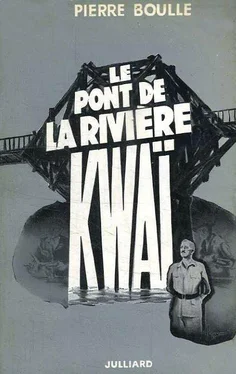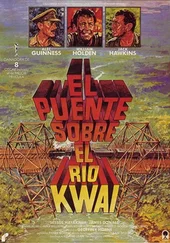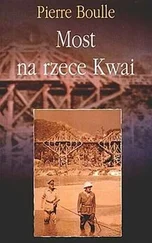Colonel Nicholson had frowned without saying a word. He was not “in charge” of this camp, and considered himself almost as a guest there. To the British lieutenant colonel who ran it under Japanese orders, he had only once expressed what he felt; that was when he noticed that all the officers below the rank of major were doing their share of manual labor on exactly the same footing as the men—in other words, they were digging and carting like navvies. The lieutenant colonel had hung his head. He explained that he had done his best to avoid this humiliation and had given in to brutal compulsion only in order to avoid the reprisals from which everyone would have otherwise suffered. Colonel Nicholson had nodded in a manner that showed he was far from convinced, and had then taken refuge in haughty silence.
They had stayed two days in this reception center, long enough for the Japanese to issue each of them some meager haversack rations and a triangle of coarse cloth which fastened around the waist with strings, which they referred to as “working kit”; long enough also the see General Yamashita perched on a makeshift platform, with his sword at his hip and pale-gray gloves on his hands, and to listen to him first explaining in faulty English that they had been placed under his command in accordance with the wishes of His Imperial Majesty, and then telling them what was expected of them.
The tirade, which lasted over two hours, had been painful to hear, and hurt their national pride just as much as the curses and the blows. He had told them that the Japanese had no quarrel with people like them, who had been led astray by the lies of their government; that they would be decently treated so long as they behaved like “zentlemen,” that is to say, if they contributed with all their heart and with all their strength to the Southeast Asia Coprosperity Sphere. They should all recognize their obligation to His Imperial Majesty, who was giving them this chance to mend the error of their ways by contributing to the common cause and helping to build the railway. Yamashita had then explained that in the general interest he would have to impose the strictest discipline and would tolerate no disobedience. Laziness and neglect would be treated as crimes. Any attempt to escape would be punished by death. The British officers would be responsible to the Japanese for their men’s behavior and efficiency.
“Sickness will not be considered an excuse,” General
Yamashita had added. “Reasonable work is the best thing in the world for keeping a man physically fit, and dysentery would think twice before attacking anyone who makes a daily effort to do his duty toward the Emperor.”
He had concluded on an optimistic note, which had driven his audience wild with anger.
“Be happy in your work,” he said, “that’s my motto. Make it your motto as well from now on. Those who live up to it will have nothing to fear from me, nor from the officers of the Japanese Grand Army which is now protecting you.”
Then the units had been dispersed, each one moving off to the sector it had been allotted. Colonel Nicholson and his battalion had made their way to the camp on the River Kwai, which was quite far off, only a few miles from the Burmese border. The commandant was Colonel Saito.
Some nasty incidents punctuated the first few days in the Kwai camp, where an uneasy undercurrent of tension was at once noticeable in the atmosphere.
The cause of the initial disturbances was Colonel Saito’s proclamation stipulating that all officers were to work side by side with the other ranks and on the same footing. This provoked a polite but firm protest from Colonel Nicholson, who outlined his ideas on the subject candidly and methodically, adding in conclusion that the task of British officers was to command their men and not to wield a pick and shovel.
Saito listened to the whole speech without a sign of impatience—which the Colonel interpreted as a favorable omen—and then dismissed him, saying that he would think the matter over. Colonel Nicholson returned full of confidence to the squalid bamboo hut which he shared with Clipton and two other officers. There he repeated for his own personal satisfaction some of the arguments he had used to convince the Japanese. To him each of them seemed quite conclusive, but the soundest of all in his eyes was this: the total output of a few men unused to manual labor was negligible, while the extra effort that would be made under the supervision of efficient officers was immense. In the interests of the Japanese, therefore, and to ensure that the work was properly done, it was preferable not to deprive the officers of their positions of authority, which they would lose if they were detailed to do the same fatigues as the men. He warmed to his subject as he outlined it once again for the benefit of his own officers.
“Well, am I right or wrong?” he asked, turning to Major Hughes. “You’re an industrialist. Do you think we’d get any results on a job like this without a hierarchy of responsible executives?”
As a result of the losses during the tragic campaign, his headquarters staff now consisted of only two officers, apart from the Medical Officer, Clipton. He had managed to keep them together ever since Singapore, for he liked to have their opinions and always thought it advisable to put his views before them as a subject for collective discussion before taking any decision. Neither of them was a regular officer. Major Hughes in civilian life was the director of a mining company in Malaya. He had been attached to Colonel Nicholson’s battalion, and the latter had at once recognized his administrative ability. Captain Reeves in peacetime had been a public-works engineer in India. After joining as a sapper, he had been separated from his unit during the initial fighting and had been picked up by the Colonel, who had appointed him to his advisory staff. He liked collecting specialists around him. He was no military dunderhead. He was the first to realize that some civilian concerns are occasionally run on methods which the army might do well to adopt, and he never missed an opportunity of adding to his own knowledge. He had an equally high regard for technicians and executives.
“I think you’re quite right, sir,” Hughes replied.
“So do I,” said Reeves. “If you want to build a railway line and a bridge (I believe there’s some scheme afoot for a bridge across the river) you can’t afford any shoddy, amateur work.”
“I’d forgotten you’re a specialist in that sort of thing,” the Colonel mused out loud. “So you’ll understand,” he added, “why I hope I’ve driven a little sense into that fellow’s thick skull.”
“And besides,” Clipton chipped in, looking closely at his C.O., “if the common-sense argument doesn’t work, there’s always the Manual of Military Law and the Hague Convention.”
“There’s always the Hague Convention,” Colonel Nicholson agreed. “I’m keeping that up my sleeve for a second interview, if necessary.”
Clipton spoke in this sarcastic, pessimistic tone because he was very doubtful indeed of the value of an appeal to common sense. He had heard various reports on Saito’s character at the transit camp where they had halted during their march through the jungle. The Japanese officer, it was said, was sometimes open to reason, when he had not been drinking; but he turned into an utterly vicious brute as soon as he hit the bottle.
Colonel Nicholson had launched his protest on the morning of the first day, which had been set aside for moving the prisoners into the semi-derelict quarters. Saito thought it over, as he had promised. He felt there was something fishy about the whole business, and started to drink in order to clear his brain. He gradually convinced himself that the Colonel had shown intolerable lack of respect in questioning his orders, and his attitude changed imperceptibly from suspicion to cold fury.
Читать дальше











